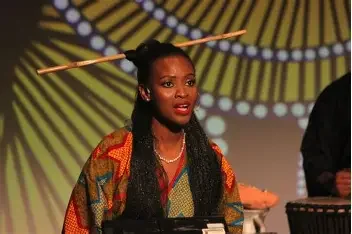Unsung Composers: Black Legacies in Classical Music
By Jennifer Skipp, 3rd Year English
When we think of the greats of classical music, names like Mozart, Beethoven, Bach and Tchaikovsky often come to mind. Yet for centuries, another rich and too often overlooked tradition has thrived alongside theirs: the music of Black composers, whose contributions have been influencing and enriching the classical music scene for generations.
We now know that Black composers were active in Europe as early as the 16th century. Vicente Lusitano was born of African descent in Portugal in 1520. He became a Catholic priest, composer and music theorist, and in 1551 left Portugal for Rome where he published a collection of choral compositions. In a 17th century manuscript about Portuguese musicians, Lusitano is described as ‘pardo’ (a commonly used term in Portugal at the time meaning mixed race). In 1752, however, Lusitano’s African heritage was omitted from the first printed encyclopaedia of Portuguese composers. This was likely a deliberate and politically motivated act of erasure, as Portugal at the time was restricting property rights for people of African descent. The omission also fit a broader European effort to preserve the image of classical music as an exclusively white domain. In spite of his talent, Lusitano’s music remained in obscurity for centuries.
However, in 18th century France, Joseph Bologne became one of the first Black composers to gain international acclaim. Born in Guadeloupe, the son of a plantation owner and enslaved woman, he was brought to France by his father in 1753 and raised there as a member of the aristocracy. At nineteen, he became a member of the court of King Louis XV, who appointed him the title ‘Chevalier de Saint-Georges’. As well as leading a Parisian orchestra as a violinist, Bologne wrote a number of chamber, operatic and orchestral works.
Bologne’s success was so remarkable that he was nicknamed ‘the Black Mozart’. Similar comparisons followed for other composers: mixed-race British composer Samuel Coleridge-Taylor (1875-1912) was dubbed ‘the African Mahler’; African American neoromantic composer Harry Lawrence Freeman (1869-1954) ‘the Black Wagner’; and Haitian composer Ludovic Lamothe (1882-1953) ‘the Black Chopin’. These labels, though meant as compliments, reveal how deeply institutionalized racism limited recognition of Black composers as artists in their own right. Far from imitative, their music was unique, marked by originality and an unmistakable individual voice.
The 20th century brought a generation of trailblazing African American composers who reshaped classical music from within. Will Marion Cook (1869–1944) staged Broadway’s first show written and performed entirely by African Americans, entitled Clorindy: The Origin of the Cakewalk. Robert Nathaniel Dett (1882–1943) became the first African American graduate of the Oberlin Conservatory, and Florence Price (1887–1953) made history in 1933 when her symphony became the first by a Black woman to be performed by a major U.S. orchestra. George Walker (1922–2018), another pioneer, became the first African American to graduate from the prestigious Curtis Institute of Music and to win the Pulitzer Prize for Music for his work ‘Lilacs’ in 1996.
Among them, William Grant Still (1895 – 1978) was named the ‘Dean of African American Composers’, achieving landmark firsts in conducting, opera, and symphonic performance. These achievements challenged both musical and social hierarchies, pushing institutions to confront long-held ideas of who belonged in the classical canon.
One of the most controversial but also lesser-known Black composers of the 20th century was Julius Eastman (1940–90). He was an early Minimalist composer who gained notoriety for works that boldly affirmed his identity as an African American gay man. Although much of his work was lost or forgotten for decades, a recent renewed wave of interest has brought him posthumous acclaim. Like Lusitano and countless others before him, Eastman’s legacy stands as a reminder that innovation in music has always been intertwined with the struggle for visibility and self-expression.
Each breakthrough by a Black composer has helped widen the boundaries of classical music, but it’s important to note that not all sought to write music with such an agenda. Many simply wished for their music to be judged on musical merit, free from limitations or expectations. Arizona-born Ulysses Kay told The Washington Post after a performance of his 1991 opera Frederick Douglass: ‘I wasn’t composing operas to prove anything. I write out of interest, rather than trying to take up the cause of Blackness or whatever.’ He deliberately steers clear of spirituals and jazz, believing that composers should feel no obligation to express their racial or cultural identity in their music. Jamaican composer Eleanor Alberga asserted that ‘music has no pigmentation […] and in an ideal world culture should be engendered by environment, not forced by listeners’ expectations of composers reaching into their DNA and plucking out a spiritual here, or an Asian pentatonic trope there.’
Helen Parker-Jayne Isibor in Song Queen: A Pidgin Opera (credit: Claire Shovelton)
Today, a new generation of Black composers is redefining the classical landscape. From Errollyn Wallen’s Proms premieres to Daniel Kidane’s politically charged ‘Woke’ and Helen Parker-Jayne Isisbor’s pioneering opera in Pidgin English, their work broadens both the sound and the horizons of classical music.
Though long overlooked, Black composers have for centuries shaped and enriched the art form with distinct voices and visions. By listening to, performing, and studying their music, we begin to dismantle the narrow myth of the white male composer and uncover a richer world of sound.
Edited by Eleanor Flower

